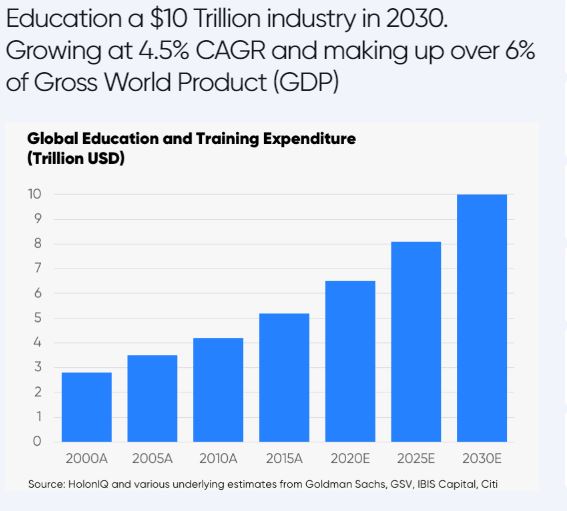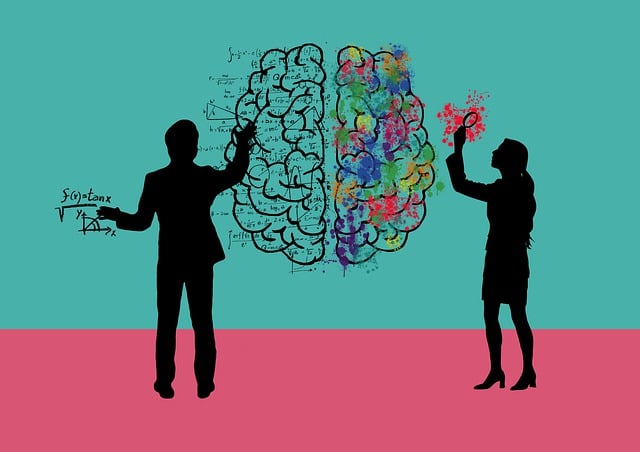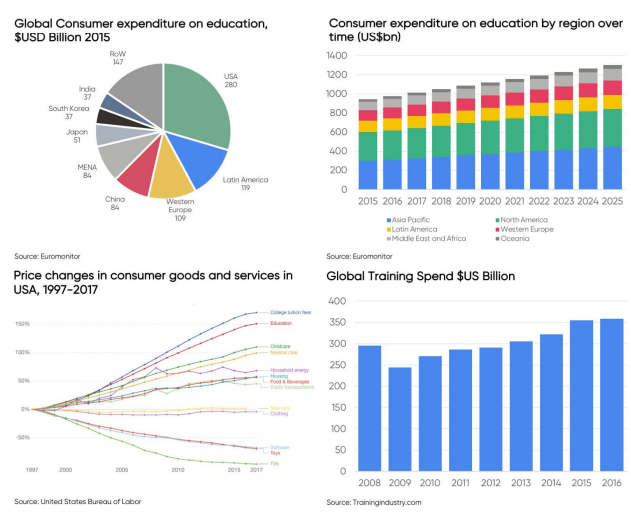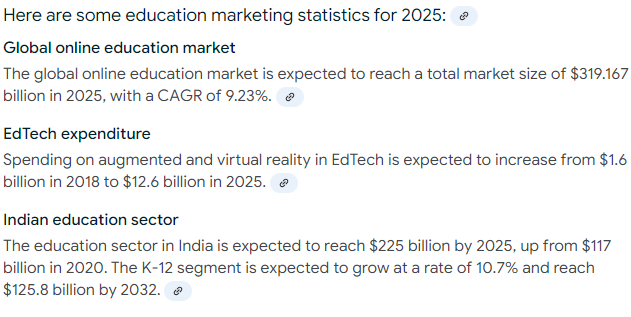With the global market for AI-powered predictive analytics expected to reach $67.86 billion by 2032, the integration of AI into higher education marketing is not just a trend but a necessity for institutions looking to remain competitive and efficient in the coming years.

Artificial intelligence (AI) is reshaping the landscape of higher education marketing, offering unprecedented opportunities to optimize recruitment, engagement, and operational efficiency.
As institutions compete for student attention in an increasingly digital world, the strategic use of AI is becoming a key component of successful education marketing strategies.
A recent report highlights that nearly 73% of education marketers have already integrated AI tools into their campaigns, reflecting a significant shift towards data-driven and automated marketing solutions.
AI enhances personalized communication by analyzing vast amounts of student data, allowing institutions to deliver tailored content that resonates with prospective applicants. Predictive analytics, a core AI application, can forecast student preferences and behaviors, enabling institutions to adjust their education marketing strategies in real-time.

This capability is particularly crucial as student expectations evolve ahead of 2025, where personalized experiences will be critical in decision-making processes. AI-powered chatbots, which provide 24/7 support and instant responses, are also becoming indispensable in streamlining communication.
With the global market for AI-powered predictive analytics expected to reach $67.86 billion by 2032, the integration of AI into higher education marketing is not just a trend but a necessity for institutions looking to remain competitive and efficient in the coming years.
Personalizing Student Communication
Artificial intelligence (AI) is revolutionizing higher education marketing by enabling institutions to create more personalized and targeted communication strategies.

As competition for student enrollment intensifies, the ability to deliver customized messaging has become a critical aspect of education marketing strategies.
AI tools, such as predictive analytics, allow universities to analyze vast amounts of data on student preferences, behaviors, and interactions. This data-driven approach enables institutions to segment their audiences more effectively, ensuring that prospective students receive personalized content that resonates with their unique needs and aspirations.
A key application of AI in education marketing is the use of personalized email campaigns. AI-driven platforms can tailor messages based on a student’s interests, academic background, and engagement history.
For example, a prospective student interested in business programs may receive targeted emails about faculty achievements, scholarship opportunities, and alumni success stories in that field.

This hyper-personalized communication significantly increases the likelihood of conversion, with research showing that personalized emails can achieve a 29% higher open rate than generic campaigns.
In addition, AI-powered chatbots are transforming how institutions engage with students. These tools provide real-time responses to inquiries, guiding students through the admissions process or helping them find relevant information about courses and campus life.
By offering 24/7 support and tailored interactions, chatbots enhance student engagement and satisfaction, which are crucial for recruitment success.
Predictive Analytics for Enrollment Forecasting
As the landscape of higher education marketing continues to evolve, AI-powered predictive analytics is emerging as a critical tool for enrollment forecasting and strategy optimization.

AI technology enables institutions to analyze both historical and real-time data, providing deeper insights into student behavior and preferences.
This allows universities to predict which students are most likely to apply, enroll, or even drop out, making it easier to adjust education marketing strategies accordingly.
By leveraging predictive analytics, higher education institutions can optimize their recruitment campaigns, targeting specific student segments with tailored messaging.
For example, predictive models can help identify prospective students who are likely to be interested in specific programs or who may need additional financial aid to make enrollment decisions. In turn, institutions can allocate their marketing budgets more effectively, focusing on the right candidates at the right time.

A recent report from Element451 highlights that institutions using predictive analytics have seen a significant improvement in student recruitment, with enrollment increases of up to 15%.
Georgia State University offers a compelling case study, as they have effectively used AI to identify enrollment trends and adjust their outreach strategies in real time, resulting in improved student retention rates and a more efficient admissions process.
Automating Student Support with AI Chatbots and Virtual Assistants
In the evolving landscape of higher education marketing, AI-powered chatbots and virtual assistants are transforming how institutions provide student support.

These tools offer 24/7 availability, ensuring that students receive immediate responses to their inquiries, whether related to admissions, financial aid, or course selection.
By automating routine tasks, AI chatbots significantly reduce response times and enhance the overall student experience, which is becoming increasingly critical as institutions prepare for 2025 and beyond.
The use of AI in education marketing strategies allows universities to efficiently manage high volumes of student inquiries without overwhelming administrative staff.
By handling routine questions, chatbots free up human resources for more complex and personalized interactions, creating a balanced approach that optimizes both automation and personal engagement.
Research by Comm100 indicates that AI chatbots can reduce response times by up to 60%, which is critical in improving student satisfaction and maintaining engagement throughout the admissions process.
A prime example is Georgia State University, which has implemented the AI-powered chatbot “Pounce.” This tool assists students with various inquiries and has contributed to a significant increase in student engagement. It also improved retention by addressing common challenges in real time, ensuring that students remain informed and supported.
AI for Data-Driven Marketing Campaigns
AI has revolutionized the ability to create more effective, targeted marketing campaigns by analyzing vast amounts of student data, such as behavior, preferences, and engagement patterns.

By using these insights, institutions can craft highly personalized marketing content, ensuring that the right message reaches the right audience at the right time.
AI’s role in higher education marketing is particularly powerful when it comes to content creation for social media, blogs, and email marketing. Predictive analytics allow institutions to identify which types of content are most likely to resonate with prospective students, improving overall engagement.
For example, AI can analyze previous campaign performance and student interaction data to recommend the optimal timing and content format for email marketing, driving higher open and click-through rates.
AI-powered platforms like HubSpot and Salesforce have transformed lead generation and nurturing by using predictive algorithms to score leads and personalize outreach based on user behavior.
According to recent reports, institutions leveraging AI in their marketing campaigns have seen up to a 30% increase in engagement metrics and improved lead conversion rates.
Ethical Considerations and Challenges
As AI becomes increasingly integrated into higher education marketing strategies, institutions must address significant ethical considerations to ensure responsible and fair use of these technologies. One of the primary concerns is the potential for bias in AI algorithms.

When AI systems are trained on historical data, they can inadvertently perpetuate existing biases related to race, gender, or socioeconomic status, influencing marketing campaigns and even admissions decisions.
According to a recent report, over 30% of institutional leader’s express concerns about the ethical implications of AI in education marketing.
Data privacy is another key issue, as AI relies heavily on collecting and analyzing vast amounts of student data. Ensuring that student information is protected and used in compliance with privacy regulations like GDPR is critical.

Transparency is equally important; students should know how their data is being used and have the ability to consent to its use in marketing efforts.
Best practices for responsible AI implementation include regular audits of AI systems to detect and mitigate bias, ensuring transparency in how AI-driven decisions are made, and incorporating human oversight to ensure ethical judgments are upheld. Institutions should also engage diverse teams in the development of AI systems to minimize bias and promote inclusivity.
Conclusion
AI is revolutionizing higher education marketing by enabling institutions to create more personalized, data-driven, and efficient marketing strategies.
By analyzing vast amounts of student data, AI can predict student behavior, tailor communication, and streamline processes such as admissions and student support. Reports indicate that institutions using AI in their education marketing strategies have seen engagement increases of up to 30%, highlighting its transformative impact.
Looking ahead to 2025, AI’s role in education marketing will continue to grow. We can expect advancements in predictive analytics, further enhancing student recruitment, and AI-powered chatbots that provide 24/7 personalized support.
As AI technology evolves, it will enable even more precise targeting and content personalization, improving the overall student experience and recruitment outcomes.
However, it is crucial to balance AI’s efficiency with ethical considerations. Concerns around data privacy, bias in AI systems, and the transparency of AI-driven decisions must be addressed to ensure responsible use.


